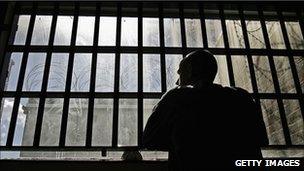Church of England could lose key prison chaplain role
- Published

In recent years there has been more of a move towards multi-faith chaplaincy
The Church of England could lose its traditional role as the provider of the chief chaplain to the Prison Service.
The Ministry of Justice has confirmed it is "considering arrangements" for appointing a new Chaplain-General - but the job might not go to an Anglican.
Prison chaplains can be of different religions and denominations, but the 1952 Prison Act requires every jail to have an Anglican chaplain.
There are several Roman Catholic and Muslim chaplains who could do the role.
The Church believes the legal requirement "should be reflected" in the appointment of the Chaplain-General.
A spokesman for the bishop for prisons, the Bishop of Liverpool James Jones, said that the Church was being fully consulted on a successor to the former chaplain-general, the Venerable William Noblett.
He said Bishop Jones was in discussion with senior prison service officials.
Apart from the Anglican chaplain in each of the 144 jails in England and Wales, there are about 100 other Christian chaplains, and some 200 full-time and part-time imams.
Reduced influence
The Chaplain-General develops policy for chaplains, promotes good practice and deals with complaints and disputes.
The possibility of a non-Anglican Chaplain-General will be seen by some Anglicans as the latest sign of the reduced influence of the "established" Church of England in public affairs, along with declining church-going and traditional Christian belief.
Anglicans continue to make up the biggest single group among the prison population in England and Wales, but there are also significant numbers of Roman Catholic and Muslim prisoners.
The largest group is made up of inmates who have no religion.
One academic study of the way prison chaplains are organised in England and Wales suggested the chaplaincy service had been, in effect, a Church of England monopoly.
There have been complaints that prisoners of minority faiths had to rely on volunteer clergy, who in turn have needed full-time Christian chaplains to help arrange access to prisoners and meeting rooms.
However, over the last decade or so, there have been moves towards a more "multi-faith" chaplaincy, and the appointment of a non-Anglican Chaplain-General could be an important step in cementing it.